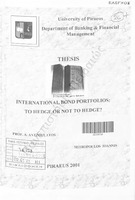International bond portfolios: to hedge or not to hedge?

Προβολή/
Θεματική επικεφαλίδα
Διαχείριση χαρτοφυλακίου ; Portfolio management ; Ομόλογα ; Bonds ; Hedge fundsΠερίληψη
This thesis, as the title suggests is motivated by the fact that the hedging decision is a rather controversial matter, which cannot get a clear answer. Yet, the decision" To Hedge or not to Hedge?" is very important to thousands of investors and asset managers. With the thesis and the attendant empirical work, we shall try to shed some light on aspects of the extensive debate in the existing literature. The hedging motivation differs from investor to investor across the world. In the literature it has been almost exclusively analyzed from the perspective of the US investor. This study also analyzes it from the perspective of the European investor and the Japanese investor. The decision to hedge or not to hedge has grown in significance lately as the international capital has progressively become more mobile. Because of eliminations of the government's prohibitory the motivation for an international investment is being more and more strong. As a result, investors are exposed not only to the interest rate risk but to foreign exchange risk as well. The latter, additionally, appears to be more pronounced compared to the former. Hedging exchange rate risk is easier said than done. This has to do with the many aspects of the decision. Namely, should we make full or partial hedging? Is there any optimal hedge ratio? Should we face hedging as a passive strategy or an active one? Should we buy a particular foreign asset from a particular country or we must diversity in several countries? Or finally' should we hedge at all?


